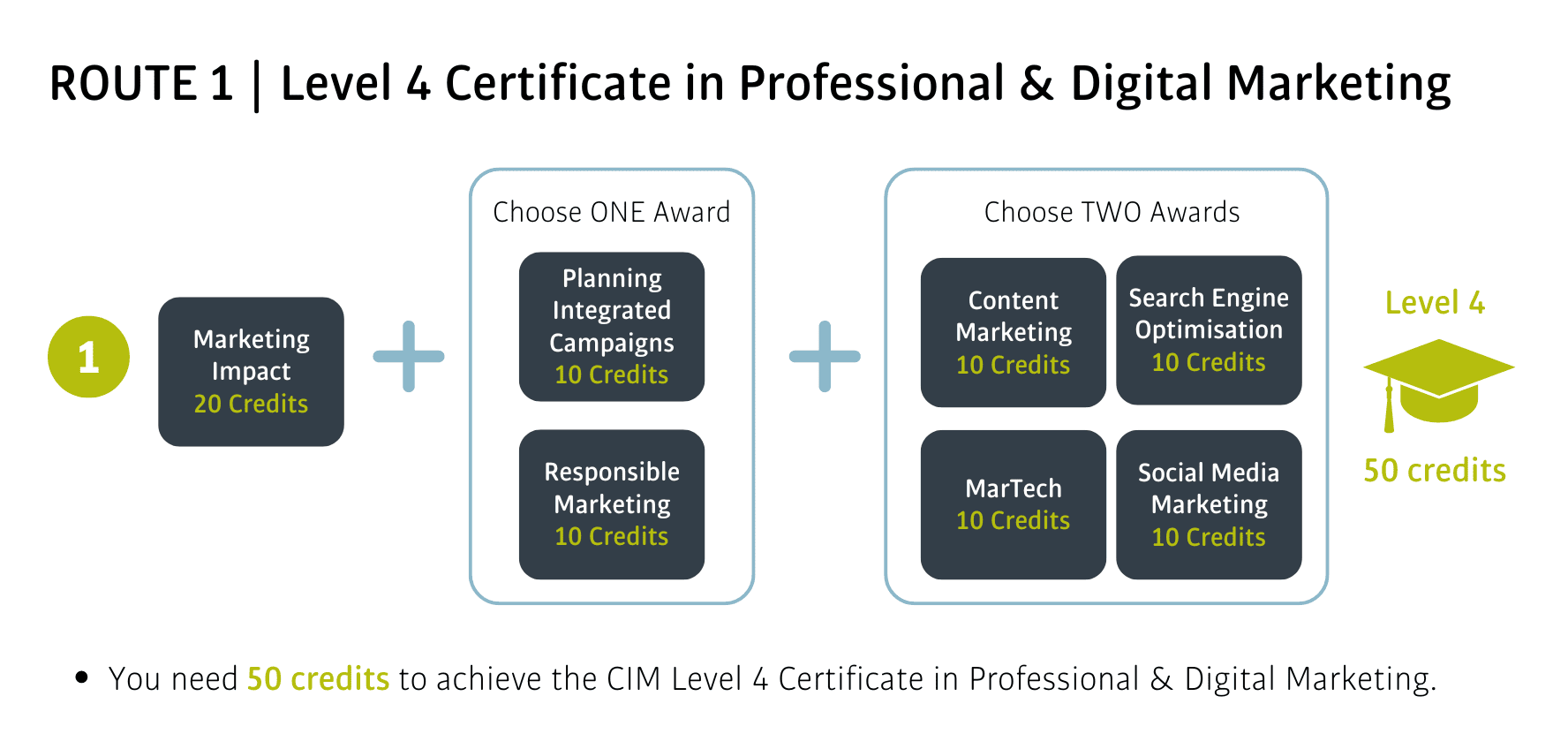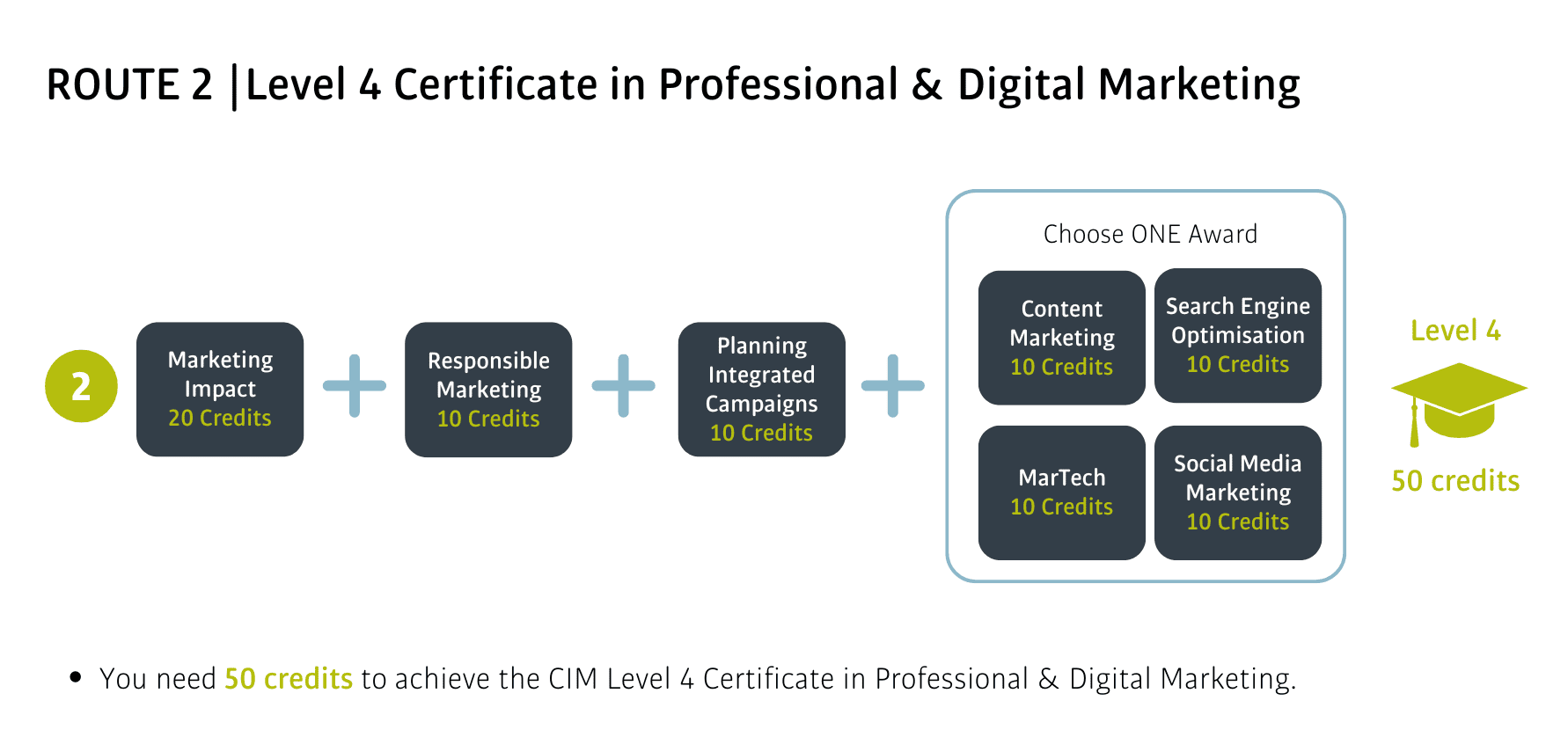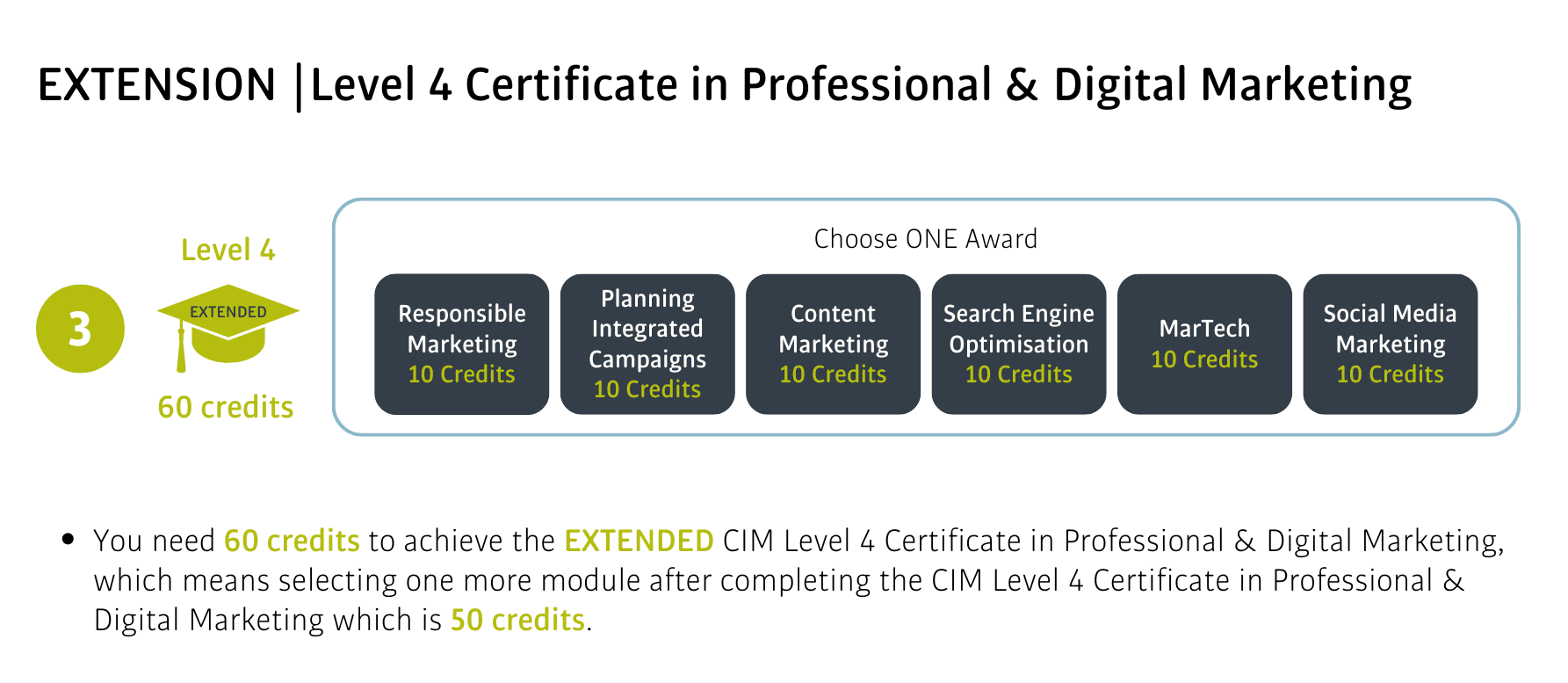Course Overview
A CIM qualification at Level 4 builds on your tactical marketing skills, enabling you to advance your marketing career and perform professionally at an operational level within your marketing department.
To achieve the qualification at Level 4, you’ll need to gain a pass in all the modules you choose.
Each module of the qualification can also be studied and achieved as an individual award.
There are different pathways to achieve the Certificate in Professional and Digital Marketing.
Speak to Jen Lorimer, our Client Relationship Manager for advice.
nesma has cohorts starting at regular intervals throughout the year.


To gain the extended certificate, you will need to complete and pass one additional module from the selection below.

- Marketing Impact
- Planning Integrated Campaigns
- Responsible Marketing
- Content Marketing
- Social Media Marketing
- MarTech
- Search engine optimisation
Marketing Impact
Aims of the module
This module focuses on the role of marketing in the organisation and the key concepts that underpin the activities of the marketer. You will explore the marketing environment, customer behaviour in the digital age, market research and the marketing planning process. This will include the marketing mix and a tactical planning framework to aid marketing effectiveness.
Upcoming start dates:
We run these modules every January, March, June & September
Module structure
The module comprises five learning outcomes each. Each learning outcome will be covered by the related assessment criteria and will be assessed by way of examination. By the end of this module, you should be able to:
Learning Outcome 1: Understand the purpose and contribution of marketing to the organisation
- Assess the purpose of marketing in an organisation
- Discuss the scope of marketing activities
Learning Outcome 2: Understand the factors and trends in the marketing environment and how they impact on marketing decision making
- Describe the process and tools involved in conducting a marketing audit
- Appraise the sources of marketing data
- Analyse data to gain insight and support effective decision-making
Learning Outcome 3: Recognise what influences buyer behaviour in various contexts
- Assess the importance of customer/ consumer buying behaviour
- Appraise the influences on the consumer decision making process
- Compare different types of buying behaviour
Learning Outcome 4: Understand how to develop an effective marketing plan
- Assess relevant marketing strategies to deliver marketing objectives
- Recommend an effective marketing mix to achieve identified marketing objectives
- Outline how to develop appropriate channels and content to achieve identified marketing objectives
Learning Outcome 5: Understand how to effectively manage the implementation of and control the marketing plan
- Explore the key elements required for coordination and management of marketing plans
- Recommend key metrics and methods for the measurement of marketing performance
Planning Integrated Campaigns
Aims of the module
This module is designed to help develop an understanding of the rapidly changing marketing landscape. Candidates will learn about the core concepts of marketing and explore digital innovation. Candidates will gain an understanding of how content plays a crucial role in the customer lifecycle and how audiences interact with both digital and traditional media. Finally, this module will teach candidates how to create integrated marketing campaigns across various channels, online and offline, and how to measure their effectiveness.
Upcoming start dates:
We run these modules every January, March, June & September
Module structure
The module comprises three learning outcomes each. Each learning outcome will be covered by the related assessment criteria and will be assessed by way of examination. By the end of this module, you should be able to:
Learning Outcome 1: Understand how the organisation interacts with customers
- Assess the scope of marketing communications campaigns
- Assess innovation in digital marketing techniques
Learning Outcome 2: Understand customer engagement with media and content
- Describe customer behaviour and interaction with digital and offline media
- Illustrate the importance of ‘content’ throughout the customer lifecycle
Learning Outcome 3: Understand how to develop a customer-centric and integrated campaign plan
- Recommend elements of the integrated communications campaign plan
- Assess relevant communication channels to engage a target audience
- Assess success in applying marketing measurement techniques
Responsible Marketing
Aims of the module
This module examines responsible marketing as an imperative as societal and environmental challenges grow. There is increasing scrutiny of brands’ behaviour regarding
diversity, inclusion, and sustainability, leading to more discerning consumer choices. Marketing needs to understand and ensure socially responsible practices, prioritise transparency and honesty to build trust and be more considerate about their messaging, channels and tactics.
Upcoming start dates:
We run these modules every January, March, June & September
June
Module structure
The module comprises three learning outcomes each. Each learning outcome will be covered by the related assessment criteria and will be assessed by way of examination. By the end of this module, you should be able to:
Learning Outcome 1: Understand the impact of the marketing environment on an organisation’s ethical, responsible, and sustainable decision-making
- Explain the impact of factors in the external environment (macro)
- Explain the impact of factors in the external micro-environment (stakeholders)
- Explain the impact of factors in the internal environment
Learning Outcome 2: Understand the role marketing plays in supporting an organisation’s ethical, social and sustainable agendas
- Explain the purpose of marketing in a responsible business context
- Discuss the adaptation of the marketing mix in the context of ethical and sustainable marketing
Learning Outcome 3: Understand how the marketing mix can be adapted to meet both societal and commercial objectives
- Explain how an adapted marketing mix can achieve ethical, societal and sustainability goals
- Explain how responsible marketing practices can support the achievement of commercial objectives
- Assess methods for measuring responsible marketing (social, ethical, sustainable)
Content Marketing
Aims of the module
This module looks at content marketing and its crucial role in delivering effective digital marketing campaigns. This module provides the knowledge and skills to successfully create content to support marketing goals. You will learn how different content formats can be used within campaigns to support the customer journey and the impact developing technology can have on content production. You will gain the skills to produce a suitable content plan to support organisational initiatives.
Upcoming start dates:
We run these modules every January, March, June & September
Module structure
The module comprises three learning outcomes each. Each learning outcome will be covered by the related assessment criteria and will be assessed by way of examination. By the end of this module, you should be able to:
Learning Outcome 1: Recognise the importance of content marketing to organisations
- Assess the scope of content marketing
- Recommend how content marketing can support digital marketing activities
Learning Outcome 2: Understand different content formats across a range of contexts
- Assess different content marketing formats
- Explain how content can support target audience needs
Learning Outcome 3: Understand how to create a content marketing plan
- Explain the key steps in creating a content plan to support marketing activities
- Describe the role of developing technologies in content creation
- Recommend metrics to evaluate content marketing performance
Social Media Marketing
Aims of the module
This module provides the knowledge and skills to develop and implement successful social media marketing activities. You will learn how to apply a range of social media channels and produce suitable content to enhance an organisation’s digital activities. You will learn to produce an effective social media plan and measure its outcomes.
Upcoming start dates:
We run these modules every January, March, June & September
Module structure
The module comprises three learning outcomes each. Each learning outcome will be covered by the related assessment criteria and will be assessed by way of examination. By the end of this module, you should be able to:
Learning Outcome 1: Recognise the importance of social media for organisations
- Assess the scope of social media marketing
- Explain how social media influences consumer behaviour
Learning Outcome 2: Understand the different applications of social media
- Explain social media channels in different organisational contexts
- Determine the role of content in supporting social media activities
Learning Outcome 3: Understand how to develop a social media marketing plan
- Discuss the key components of a social media plan
- Recommend metrics to measure social media activities
MarTech
Aims of the module
This module focuses on marketing technology, or ‘Martech’, which is now essential to facilitate and execute marketing activities. It will provide knowledge on the importance and application of ‘Martech’, including Artificial Intelligence, within organisations. You will learn how ‘Martech’ can be used across the customer journey to support paid campaigns and social media activities to nurture long-term MCQ relationships. You will gain the skills to analyse web analytics outputs successfully and make suitable recommendations for the future.
Upcoming start dates:
We run these modules every January, March, June & September
Module structure
The module comprises three learning outcomes each. Each learning outcome will be covered by the related assessment criteria and will be assessed by way of examination. By the end of this module, you should be able to:
Learning Outcome 1: Understand the significance of MarTech for an organisation
- Assess the scope of MarTech across a variety of organisational contexts
- Determine the impact of AI on marketing technology
Learning Outcome 2: Recognise applications of MarTech across the customer journey
- Explain the role of ‘AdTech’ in supporting paid digital campaigns.
- Assess how social media tools can be used to improve the management of social media activities
- Explain how CRM technology can support customer relationships
Learning Outcome 3: Understand customer insights delivered by web analytics platforms
- Explain the measures accessed in analytics platforms
- Recommend how data from analytics platforms can be used to inform future marketing activities
Search engine optimisation
Aims of the module
This module focuses on the importance of search engine marketing for organisations as part of their digital marketing activities. You will learn the key success factors for Search Engine optimisation as well as how to create effective paid search campaigns to achieve marketing goals.
Upcoming start dates:
We run these modules every January, March, June & September
Module structure
The module comprises three learning outcomes each. Each learning outcome will be covered by the related assessment criteria and will be assessed by way of examination. By the end of this module, you should be able to:
Learning Outcome 1: Understand the importance of search engine marketing for organisations
- Assess the scope of search engine marketing
- Discuss the role of keyword research
Learning Outcome 2: Recognise the success factors for Search Engine Optimisation (SEO)
- Determine the role of content in SEO
- Discuss off-page SEO techniques
Learning Outcome 3: Understand how to develop effective paid search campaigns
- Describe the steps in creating paid search campaigns
- Recommend approaches for measuring paid search campaign performance
Assessment Method
To achieve this CIM qualification at Level 4, you’ll need to pass all the modules you choose.
- The 2-hour examination will be online and comprise multiple-choice questions.
Entry Requirements
The go-to for marketing executives, or equivalent, who have had experience in the industry and are looking to advance their careers. You can choose between two qualifications to suit your individual career path.
To study the Certificate in Professional and Digital Marketing, you’ll need to have a minimum of one year’s experience in the industry or a relevant level 3 qualification.
If English is not your first language, you will need to demonstrate you’ve achieved an equivalent qualification.
Course Dates
We run these modules every January, March, June & September
For more info please contact jen.lorimer@nesma.co.uk.
What our students say
Notice: Undefined variable: video in /home/nesmaco/public_html/dev.nesma.co.uk/wp-content/themes/nesma_child/inc/shortcodes.php on line 597
Notice: Undefined variable: video in /home/nesmaco/public_html/dev.nesma.co.uk/wp-content/themes/nesma_child/inc/shortcodes.php on line 643
Notice: Undefined variable: video in /home/nesmaco/public_html/dev.nesma.co.uk/wp-content/themes/nesma_child/inc/shortcodes.php on line 643

